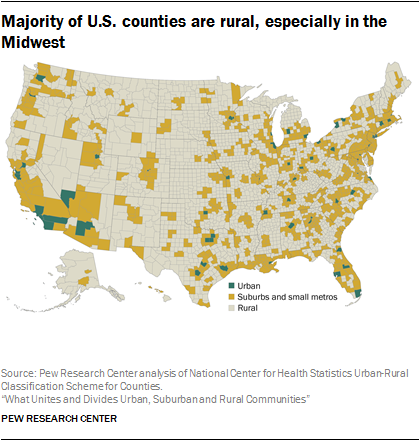Strong communities are an essential part of America, but where we live, how we live, and how we interact with each other is changing. The ability to buy almost anything online, have our groceries delivered straight to our door, and work remotely instead of from an office creates a very different picture of Main Street. What do people today want in their communities? How are America’s communities and the face of Main Street changing? Is a loss of personal connection through digitization impacting communities? And who plays a role in fixing communities that may be on the decline? Here are some interesting facts:
- A community’s well-being is often related to that of its residents in terms of physical health and happiness.
- Across the United States, there are approximately 46 million rural counties, 175 million suburban counties, and 98 million urban core counties (Pew).

- Some estimates show U.S. economic output (production of goods and services) as a whole is 14 percent smaller due to local regulatory constraints such as zoning, which often restrict housing supplies and prevent American workers from accessing the most productive American cities.
- Small businesses (defined as 500 employees or fewer) made up 99.9 percent of all businesses in the U.S. in 2018 and employed 47.5 percent of U.S. employees, about 60 million people.
The Policy Circle’s The Changing Fabric of Neighborhoods Brief explores all of these topics and what governments, businesses, communities, and individuals are doing to build, strengthen, and revitalize communities across America. The discussion guide offers some great questions for you to consider and for you to use at your next circle discussion. Here are some more: In what ways have you seen your community change in recent years? Do you think your community has a particular strength or weakness? What are your priorities for your community, and who are the decision makers and stakeholders you can speak to about concerns or ideas?
Dive deeper into these issues by reading The Policy Circle’s Changing Fabric of Neighborhoods Brief and registering for the Fourth Annual Policy Circle Leadership Summit today.

The Policy Circle is a 501(c)3 which provides a fact-based, nonpartisan framework built to inspire women living in the same community to connect, learn about and discuss economic policies that impact their lives. Women across the nation are taking a leadership role in the public policy dialogue on what human creativity can accomplish in an open economy.